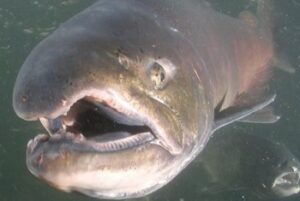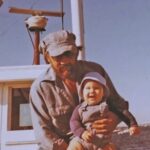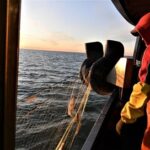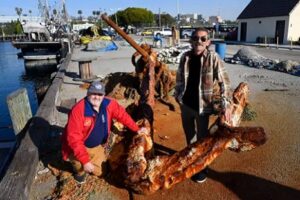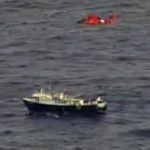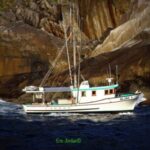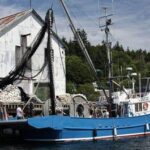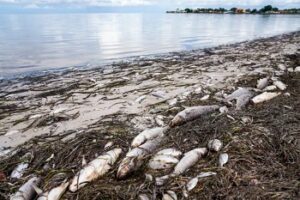Category Archives: South Atlantic
South Carolina Working Waterfront: Rural attitude, commercial fishing still embraced in McClellanville
 McClellanville stands apart from other working waterfronts in South Carolina in a couple of important ways. Its geographic isolation has helped maintain a rural attitude, and commercial fishing remains the economic driver for the community. These days, the town that got its start as a summer resort for plantation owners has the least touristy feel of South Carolina coastal communities. The small commercial section of the Jeremy Creek waterfront is dominated by two commercial docks—at Carolina Seafood and Livingston’s Bulls Bay Seafood. A public boat landing with limited parking spaces gets crowded on weekends and during the public shrimp-baiting season in the fall, but most of those boats head into the Intracoastal Waterway and leave the working waterfront behind. Read the rest of the story here 12:06
McClellanville stands apart from other working waterfronts in South Carolina in a couple of important ways. Its geographic isolation has helped maintain a rural attitude, and commercial fishing remains the economic driver for the community. These days, the town that got its start as a summer resort for plantation owners has the least touristy feel of South Carolina coastal communities. The small commercial section of the Jeremy Creek waterfront is dominated by two commercial docks—at Carolina Seafood and Livingston’s Bulls Bay Seafood. A public boat landing with limited parking spaces gets crowded on weekends and during the public shrimp-baiting season in the fall, but most of those boats head into the Intracoastal Waterway and leave the working waterfront behind. Read the rest of the story here 12:06
Enviros, Fishing interests balk at Obama’s exclusion of S.C. coastlines from drilling ban
 “We are extremely disappointed,” Frank Knapp, president and CEO of the South Carolina Small Business Chamber of Commerce and co-founder of the Business Alliance for Protecting the Atlantic Coast, told The Post and Courier. Last week, Knapp’s organization, representing 35,000 businesses and 500,000 commercial fishing families, delivered a letter to the Obama administration asking for a ban on drilling and seismic testing. “Oil and gas exploration and development activities threaten the vibrant coastal environment that supports nearly 1.4 million jobs and contributes $95 billion to the annual gross domestic product, mainly through tourism, commercial fishing and recreation,” Knapp and fellow BAPAC members wrote. “Our currently thriving East Coast businesses are reliant upon healthy ocean ecosystems and are inextricably tied to clean, coastal waters.” The pleas appeared to have fallen on deaf ears. Read the rest here 11:42
“We are extremely disappointed,” Frank Knapp, president and CEO of the South Carolina Small Business Chamber of Commerce and co-founder of the Business Alliance for Protecting the Atlantic Coast, told The Post and Courier. Last week, Knapp’s organization, representing 35,000 businesses and 500,000 commercial fishing families, delivered a letter to the Obama administration asking for a ban on drilling and seismic testing. “Oil and gas exploration and development activities threaten the vibrant coastal environment that supports nearly 1.4 million jobs and contributes $95 billion to the annual gross domestic product, mainly through tourism, commercial fishing and recreation,” Knapp and fellow BAPAC members wrote. “Our currently thriving East Coast businesses are reliant upon healthy ocean ecosystems and are inextricably tied to clean, coastal waters.” The pleas appeared to have fallen on deaf ears. Read the rest here 11:42
Coral plan threatens fishing grounds
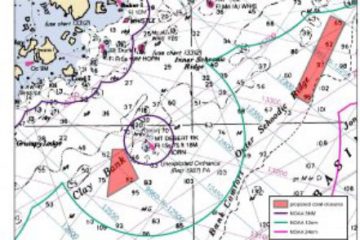 The NEFMC is working with the Mid-Atlantic Fishery Management Council and the South Atlantic Fishery Management Council to preserve deep-sea corals from the Canadian border to Virginia. Area lobstermen could lose valuable fishing grounds if a federal proposal to close four areas of Gulf of Maine waters comes to fruition. The New England Fishery Management Council (NEFMC) has drafted a plan that would close a span of 161 square miles offshore to commercial fishing in an effort to conserve deep-sea coral there. Two of those areas, Mount Desert Rock in Lobster Management Zone B and Outer Schoodic Ridge in Lobster Management Zone A, are preferred fishing grounds for local fishermen when lobster head further offshore in the winter. The other proposed offshore closure areas lie in Jordan Basin and Lindenkohl Knoll to the south. Read the story here 09:34
The NEFMC is working with the Mid-Atlantic Fishery Management Council and the South Atlantic Fishery Management Council to preserve deep-sea corals from the Canadian border to Virginia. Area lobstermen could lose valuable fishing grounds if a federal proposal to close four areas of Gulf of Maine waters comes to fruition. The New England Fishery Management Council (NEFMC) has drafted a plan that would close a span of 161 square miles offshore to commercial fishing in an effort to conserve deep-sea coral there. Two of those areas, Mount Desert Rock in Lobster Management Zone B and Outer Schoodic Ridge in Lobster Management Zone A, are preferred fishing grounds for local fishermen when lobster head further offshore in the winter. The other proposed offshore closure areas lie in Jordan Basin and Lindenkohl Knoll to the south. Read the story here 09:34
Obama blocks drilling in Arctic, Atlantic oceans
 President Obama on Tuesday formally blocked offshore oil and gas drilling in most of the Arctic Ocean, answering a call from environmentalists who say the government needs to do more to prevent drilling in environmentally sensitive areas of U.S.-controlled oceans. Obama is invoking a 1953 law governing the Outer Continental Shelf to block drilling in federal waters in the Arctic’s Chukchi Sea and most of its Beaufort Sea. He also protected 21 underwater canyons in the Atlantic Ocean from drilling, White House officials said Tuesday. Canada will block drilling in all of its Arctic Ocean acreage, a moratorium officials will review every five years, the White House said. Read the story here 17:02
President Obama on Tuesday formally blocked offshore oil and gas drilling in most of the Arctic Ocean, answering a call from environmentalists who say the government needs to do more to prevent drilling in environmentally sensitive areas of U.S.-controlled oceans. Obama is invoking a 1953 law governing the Outer Continental Shelf to block drilling in federal waters in the Arctic’s Chukchi Sea and most of its Beaufort Sea. He also protected 21 underwater canyons in the Atlantic Ocean from drilling, White House officials said Tuesday. Canada will block drilling in all of its Arctic Ocean acreage, a moratorium officials will review every five years, the White House said. Read the story here 17:02
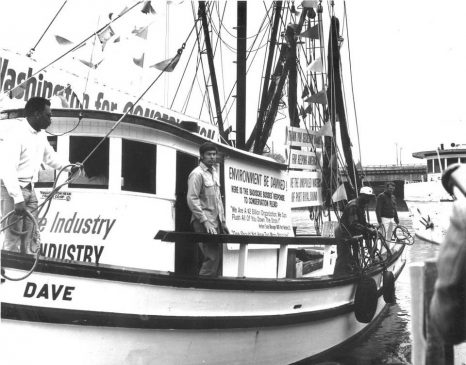
How a diverse band of locals won Beaufort County’s biggest environmental battle
“It’s Official! Plans Announced,” screamed a banner headline in The Beaufort Gazette of Oct. 2, 1969. BASF, the international chemical giant based in Germany, announced it was going to build a $100 million petrochemical plant on Victoria Bluff near Bluffton. It would expand to an industrial complex with an investment as high as $400 million, the biggest manufacturing fish ever landed by the state of South Carolina, even for that era of New South boosterism. The political hierarchy of Beaufort County and Columbia was euphoric. It would cure the abject poverty in the county — where it was reported that children had worms, and adults were malnourished and illiterate.,, The Capt. Dave shrimp trawler remains the lasting image of the fight. She chugged into Beaufort County history with a 777-mile, week-long trip from Hilton Head to Washington, D.C., in April 1970. The 43-foot boat was a symbol of a small band taking on an opponent the size of an aircraft carrier. It was a symbol of Lowcountry life and clean water. Its mission was to deliver petitions against the plant to U.S. Secretary of the Interior Walter J. “Wally” Hickel. Read the story here. 09:08
Plan for Dusky shark doesn’t please Oceana cons
 The federal government isn’t going far enough with a plan to protect a threatened shark that lives off the East Coast and has been decimated by the fin trade, some conservationists argue. The National Marine Fisheries Service is proposing changes to federal fishing rules with the goal of protecting dusky sharks, a large species that is down to about 20 percent of its 1970s population off the East Coast and in the Gulf of Mexico because of commercial fishing for the species that’s now illegal off the U.S. Dusky sharks were long hunted for their meat and oil, as well as their fins, which are used to make soup in traditional Chinese cooking. The fisheries service is proposing a suite of new rules for recreational and commercial fishermen designed to protect the shark, which is sometimes still killed via accidental bycatch by fishermen seeking other species. But conservation group Oceana said the rules aren’t strict enough and leave the sharks vulnerable. Read the story here 11:29
The federal government isn’t going far enough with a plan to protect a threatened shark that lives off the East Coast and has been decimated by the fin trade, some conservationists argue. The National Marine Fisheries Service is proposing changes to federal fishing rules with the goal of protecting dusky sharks, a large species that is down to about 20 percent of its 1970s population off the East Coast and in the Gulf of Mexico because of commercial fishing for the species that’s now illegal off the U.S. Dusky sharks were long hunted for their meat and oil, as well as their fins, which are used to make soup in traditional Chinese cooking. The fisheries service is proposing a suite of new rules for recreational and commercial fishermen designed to protect the shark, which is sometimes still killed via accidental bycatch by fishermen seeking other species. But conservation group Oceana said the rules aren’t strict enough and leave the sharks vulnerable. Read the story here 11:29
Research reveals black gill kills shrimp
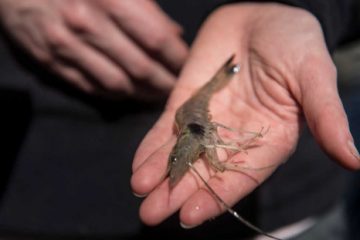 A disease that’s crippling the shrimp industry may be doing more damage than originally thought. Researchers in our region have made new findings about black gill disease, this as the industry is still rebounding from the worst shrimp harvest in Georgia history. The latest findings from scientists with the University of Georgia’s Skidaway Institute of Oceanography is unsettling. It reveals black gill may continue to push the shrimp industry into the red. “We’ve observed in controlled laboratory situations, mortality events, death of shrimp, that could only be caused by them having black gill. We’ve removed all other predators, uh, we have control groups where they don’t die, so it’s not something else in the water, but the ones with the black gill are dying.” said Dr. Marc Frischer with the UGA Skidaway Institute of Oceanography. Video, read the story here 08:58
A disease that’s crippling the shrimp industry may be doing more damage than originally thought. Researchers in our region have made new findings about black gill disease, this as the industry is still rebounding from the worst shrimp harvest in Georgia history. The latest findings from scientists with the University of Georgia’s Skidaway Institute of Oceanography is unsettling. It reveals black gill may continue to push the shrimp industry into the red. “We’ve observed in controlled laboratory situations, mortality events, death of shrimp, that could only be caused by them having black gill. We’ve removed all other predators, uh, we have control groups where they don’t die, so it’s not something else in the water, but the ones with the black gill are dying.” said Dr. Marc Frischer with the UGA Skidaway Institute of Oceanography. Video, read the story here 08:58
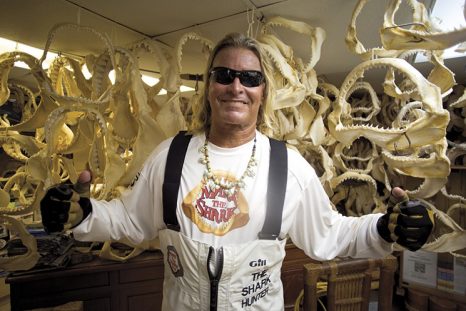
Charter fisherman catches kilo of cocaine off Miami coast
Miami fisherman Mark Quartiano takes pride in his ability to catch sharks, but on Wednesday he reeled in something else entirely: cocaine. He thinks the package had been in the water for a few weeks, as it had barnacles on it. Further inspection revealed (click for video) it to be a kilo of cocaine. “Lo and behold, it was one of those square grouper”, Quartiano joked to WPLG-TV. (click for uncensored reaction video) Quartiano is described by Miami New Times as a “love-him-or-hate-him shark fisherman” who “delights in rankling conservationists”. Read the rest here 11:26
Marathon fisherman pinched for untagged lobster traps, bad bouy charges
 A Marathon commercial fisherman faces more than 130 conservation counts after being charged with fishing illegal lobster traps. Franklin Garcia Jimenez, 40, was arrested before dawn Tuesday as part of a trap-tag case filed by Florida Fish and Wildlife Conservation Commission officers. Garcia is charged with “fishing more than 50 working, untagged traps,” agency information Officer Bobby Dube said. FWC Investigator Danielle Munkelt and Officer Adam Garrison also filed counts accusing Garcia of using buoys that were painted with the wrong colors and buoys that do not meet legal size requirements. All of the 136 counts are misdemeanors. Garcia posted a $68,000 bond and was released from the Monroe County jail Thursday. Read the rest here 20:45
A Marathon commercial fisherman faces more than 130 conservation counts after being charged with fishing illegal lobster traps. Franklin Garcia Jimenez, 40, was arrested before dawn Tuesday as part of a trap-tag case filed by Florida Fish and Wildlife Conservation Commission officers. Garcia is charged with “fishing more than 50 working, untagged traps,” agency information Officer Bobby Dube said. FWC Investigator Danielle Munkelt and Officer Adam Garrison also filed counts accusing Garcia of using buoys that were painted with the wrong colors and buoys that do not meet legal size requirements. All of the 136 counts are misdemeanors. Garcia posted a $68,000 bond and was released from the Monroe County jail Thursday. Read the rest here 20:45
Don’t bite on risky lure of ‘catch shares’
 I can’t think of a more appropriate saying to use than “a wolf in sheep’s clothing” to describe the reality of what the Seafood Harvesters of America want to do with our offshore fisheries. The Post and Courier recently published an article and editorial that bought into the sheep’s clothing side. Year-round fishing and better fisheries data are touted. Who could be against that? But there’s a wolf: privatization of our fisheries through a scheme called “catch shares,” where fishermen and corporations are actually given ownership of our fisheries with shares that can be bought or sold like stock on Wall Street. That’s the real reason for the Seafood Harvesters of America’s existence. They’re working hard to ensure commercial fishermen own our fisheries, and in this case it’s our snapper and grouper, starting with a pilot program that could be considered by the South Atlantic Fishery Management Council and NOAA Fisheries next year. Read the op-ed here 08:02
I can’t think of a more appropriate saying to use than “a wolf in sheep’s clothing” to describe the reality of what the Seafood Harvesters of America want to do with our offshore fisheries. The Post and Courier recently published an article and editorial that bought into the sheep’s clothing side. Year-round fishing and better fisheries data are touted. Who could be against that? But there’s a wolf: privatization of our fisheries through a scheme called “catch shares,” where fishermen and corporations are actually given ownership of our fisheries with shares that can be bought or sold like stock on Wall Street. That’s the real reason for the Seafood Harvesters of America’s existence. They’re working hard to ensure commercial fishermen own our fisheries, and in this case it’s our snapper and grouper, starting with a pilot program that could be considered by the South Atlantic Fishery Management Council and NOAA Fisheries next year. Read the op-ed here 08:02
South Atlantic Fishery Management Council meeting in Atlantic Beach NC December 5 – 9, 2016
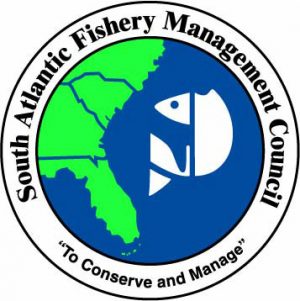 The public is invited to attend the South Atlantic Fishery Management Council to be held in Atlantic Beach NC at the DoubleTree by Hilton Atlantic Beach Oceanfront. Read the Meeting Agenda Click here, Briefing Book – June 2016 Council Meeting Click here Webinar Registration: Listen Live, Click here 15:10
The public is invited to attend the South Atlantic Fishery Management Council to be held in Atlantic Beach NC at the DoubleTree by Hilton Atlantic Beach Oceanfront. Read the Meeting Agenda Click here, Briefing Book – June 2016 Council Meeting Click here Webinar Registration: Listen Live, Click here 15:10
Big changes in the air over little menhaden? – Hearings examine ecological value, catch allocation of forage fish species
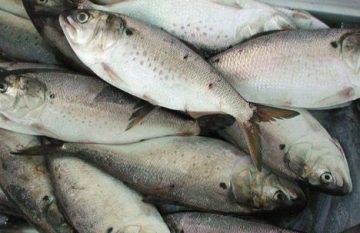 The Atlantic States Marine Fisheries Commission, which regulates near-shore fishing from Maine to Florida — including the Chesapeake Bay — has invited public comment on several questions about future management of the menhaden fishery at hearings all along the coast. Sessions in the Bay watershed begin Monday, Dec. 5. The most important issue under consideration involves setting new “reference points” regulating the catch of menhaden that would account for their value to other fish and predators — not just their commercial importance. But the commission also is weighing whether to shake up how the total catch is distributed along the coast. Read the slanted story here Review Public information document for Amendment 3 to the Interstate Fishery Management Plan For Atlantic Menhaden here 12:11
The Atlantic States Marine Fisheries Commission, which regulates near-shore fishing from Maine to Florida — including the Chesapeake Bay — has invited public comment on several questions about future management of the menhaden fishery at hearings all along the coast. Sessions in the Bay watershed begin Monday, Dec. 5. The most important issue under consideration involves setting new “reference points” regulating the catch of menhaden that would account for their value to other fish and predators — not just their commercial importance. But the commission also is weighing whether to shake up how the total catch is distributed along the coast. Read the slanted story here Review Public information document for Amendment 3 to the Interstate Fishery Management Plan For Atlantic Menhaden here 12:11
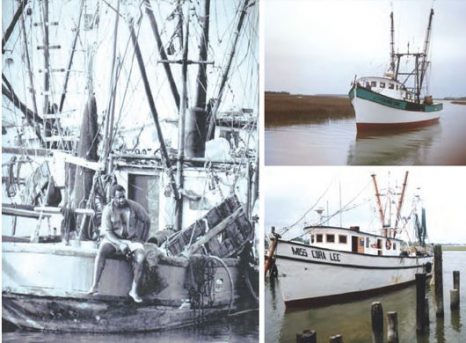
Hilton Head Fishing Co-Operative a notable piece of Lowcountry history
The phrase “life-changing” is probably over used — as well as underappreciated. Typically, when we hear this phrase, we expect to hear stories about life and death and survival and courage, and people overcoming life-threatening challenges. However, it is no exaggeration to say that all of these elements are woven into the little-known story of the Hilton Head Fishing Co-Operative, which had an enormous impact on the economy of Hilton Head Island, as well as the quality of life for many native islanders during the 1960s and ’70s. Before the co-operative, individual families relied on the waters surrounding Hilton Head as a means to sustain their way of life; it was the way families fed themselves. Looking forward to the day’s catch was no sport, because fishing provided the meals for the day. Breakfast might be shrimp and grits, lunch could be an oyster boil steamed with fresh corn from the fields, and dinner likely was rice along with the catch of the day. Interesting, well worth the read, Click here 09:05
“Operation Broken Glass” – Three Men Plead Guilty for Illegally Harvesting and Selling American Eels
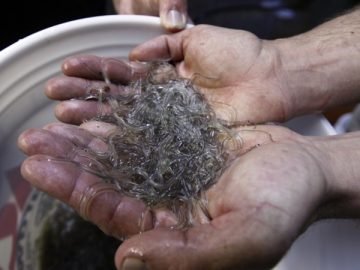 Three individuals pleaded guilty in federal district court in Charleston, South Carolina, to trafficking more than $740,000 worth of juvenile American eels aka “elvers” or “glass eels,” in violation of the Lacey Act. Harry Wertan, Jr., Mark Weihe and Jay James each pleaded guilty to selling or transporting elvers in interstate commerce, which they had harvested illegally, or knew had been harvested illegally, in South Carolina. The pleas were the result of “Operation Broken Glass,” a multi-jurisdiction U.S. Fish and Wildlife Service (USFWS) investigation into the illegal trafficking of American eels. To date, the investigation has resulted in guilty pleas for ten individuals whose combined conduct resulted in the illegal trafficking of more than $2.6 million worth of elvers. Operation Broken Glass was conducted by the USFWS and the Justice Department’s Environmental Crimes Section in collaboration with 17 state and federal agency’s. Read the rest here 08:28
Three individuals pleaded guilty in federal district court in Charleston, South Carolina, to trafficking more than $740,000 worth of juvenile American eels aka “elvers” or “glass eels,” in violation of the Lacey Act. Harry Wertan, Jr., Mark Weihe and Jay James each pleaded guilty to selling or transporting elvers in interstate commerce, which they had harvested illegally, or knew had been harvested illegally, in South Carolina. The pleas were the result of “Operation Broken Glass,” a multi-jurisdiction U.S. Fish and Wildlife Service (USFWS) investigation into the illegal trafficking of American eels. To date, the investigation has resulted in guilty pleas for ten individuals whose combined conduct resulted in the illegal trafficking of more than $2.6 million worth of elvers. Operation Broken Glass was conducted by the USFWS and the Justice Department’s Environmental Crimes Section in collaboration with 17 state and federal agency’s. Read the rest here 08:28
The Bahamas: No Chinese Commercial Fishing Allowed
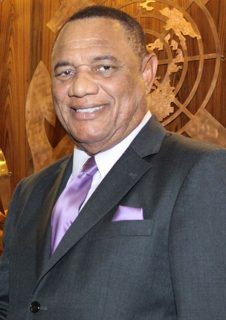 Speculation having been rife for several weeks about the remote possibility of large-scale fishing in Bahamian waters by Chinese fishing vessels. The Prime Minister of The Bahamas, the Rt. Hon. Perry Christie, has put the matter to rest in a statement released on November 22, 2016, unequivocally stating: “We are not going to compromise and no discussion will lead to a conclusion that this government would have contemplated or agreed for that to happen.” Christie emphatically stated in reports in the Nassau Guardian and Tribune daily newspapers that no mass commercial fishing will take place under foreign ownership. Christie said commercial fishing is reserved only for Bahamians, that there are no fisheries negotiations with the Chinese. The Prime Minister reiterated his government’s policy of conserving the Bahamas’ fisheries and natural resources. Read the rest here 18:47
Speculation having been rife for several weeks about the remote possibility of large-scale fishing in Bahamian waters by Chinese fishing vessels. The Prime Minister of The Bahamas, the Rt. Hon. Perry Christie, has put the matter to rest in a statement released on November 22, 2016, unequivocally stating: “We are not going to compromise and no discussion will lead to a conclusion that this government would have contemplated or agreed for that to happen.” Christie emphatically stated in reports in the Nassau Guardian and Tribune daily newspapers that no mass commercial fishing will take place under foreign ownership. Christie said commercial fishing is reserved only for Bahamians, that there are no fisheries negotiations with the Chinese. The Prime Minister reiterated his government’s policy of conserving the Bahamas’ fisheries and natural resources. Read the rest here 18:47

“Fire in the Water” – Book about history of commercial fishing in Florida published
Through firsthand accounts, “Fire in the Water” chronicles an exciting and unique slice of early Florida coastal history that might have otherwise been lost. It was written by Terry L. Howard and Donald E. Root, and was released by Adventure in Discovery, Jupiter, on Nov 7. Howard and Root will be at Vero Beach Book Center, 392 21st St. Vero Beach, on Nov 28 at 6 p.m. for a book signing. Using rare historical photos and firsthand accounts of five survivors, this book chronicles waterfront and commercial fishing life on Florida’s east coast and along the Indian River Lagoon. It centers on Cape Canaveral and Fort Pierce from early in the 20th century to the 1994 Florida net ban. It is filled with colorful sea stories and memories of earlier times. Howard and Root draw from their own commercial fishing experiences. Read the rest here 13:36
Boat captain arrested in lobster case
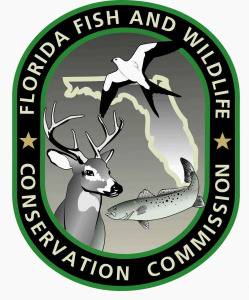 A Marathon commercial fisherman wanted by state wildlife officers for allegedly fishing for lobster with untagged traps turned himself in Thursday after returning from Cuba. Ricardo Hernandez, 52, faces 71 misdemeanor conservation violations. Earlier this month, Florida Fish and Wildlife Conservation Commission officers issued arrest warrants for Hernandez and his mates after surveilling their fishing boat for two months, said FWC Officer Bobby Dube. When the warrants were issued, FWC officers discovered he was in Cuba. Mate Juan Miguel Exposito-Carralero, 46, was also charged with 71 misdemeanor counts. He was arrested last week. Hernandez returned from Cuba recently and turned himself in at the jail, said FWC Capt. David Dipre. The case marks a shift in how some poachers are reacting to the FWC as well as the Florida Keys Commercial Fishing Association’s efforts to quelch trap robbing — they moved to fishing with untagged traps. Read the rest here 09:13
A Marathon commercial fisherman wanted by state wildlife officers for allegedly fishing for lobster with untagged traps turned himself in Thursday after returning from Cuba. Ricardo Hernandez, 52, faces 71 misdemeanor conservation violations. Earlier this month, Florida Fish and Wildlife Conservation Commission officers issued arrest warrants for Hernandez and his mates after surveilling their fishing boat for two months, said FWC Officer Bobby Dube. When the warrants were issued, FWC officers discovered he was in Cuba. Mate Juan Miguel Exposito-Carralero, 46, was also charged with 71 misdemeanor counts. He was arrested last week. Hernandez returned from Cuba recently and turned himself in at the jail, said FWC Capt. David Dipre. The case marks a shift in how some poachers are reacting to the FWC as well as the Florida Keys Commercial Fishing Association’s efforts to quelch trap robbing — they moved to fishing with untagged traps. Read the rest here 09:13
Department of Interior’s final plan abandons oil drilling off Atlantic Coast
 “I am pleased and relieved that the Department of Interior’s final plan abandons its earlier proposal to allow drilling in the Atlantic from Georgia to Virginia,” said Rep. Frank Pallone Jr. (D-6th Dist.), the top Democrat on the House Energy and Commerce Committee. “That proposal was incredibly shortsighted, and would have threatened the ecology and economy, and public health all along the Atlantic coast, including our New Jersey coastline. New Jersey lawmakers of both parties mobilized to fight the original proposal, citing the threat to tourism industry that generates $43 billion annually and supports 500,000 jobs, and a fishing industry that adds $7.9 billion a year to the state’s economy, responsible for more than 50,000 jobs. U.S. Sen. Robert Menendez (D-N.J.) urged President Barack Obama in a Senate floor speech Thursday to permanently put the Atlantic Ocean off limits to oil drilling, which he can do under the Outer Continental Shelf Lands Act. Read the rest here 08:42
“I am pleased and relieved that the Department of Interior’s final plan abandons its earlier proposal to allow drilling in the Atlantic from Georgia to Virginia,” said Rep. Frank Pallone Jr. (D-6th Dist.), the top Democrat on the House Energy and Commerce Committee. “That proposal was incredibly shortsighted, and would have threatened the ecology and economy, and public health all along the Atlantic coast, including our New Jersey coastline. New Jersey lawmakers of both parties mobilized to fight the original proposal, citing the threat to tourism industry that generates $43 billion annually and supports 500,000 jobs, and a fishing industry that adds $7.9 billion a year to the state’s economy, responsible for more than 50,000 jobs. U.S. Sen. Robert Menendez (D-N.J.) urged President Barack Obama in a Senate floor speech Thursday to permanently put the Atlantic Ocean off limits to oil drilling, which he can do under the Outer Continental Shelf Lands Act. Read the rest here 08:42
China-Bahamas fishing talks alarm Florida Officials
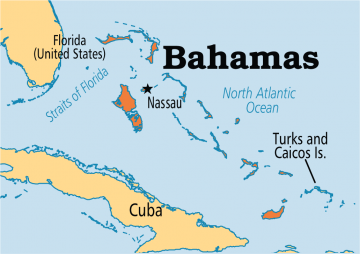 Florida wildlife officials expressed concern Wednesday that the government of the Bahamas is in talks with China to split fishing rights in waters east of Florida. State Fish and Wildlife Conservation Commission Executive Director Nick Wiley said the potential deal, as reported, could impact Florida’s commercial and sport-fishing industries. Under the reported terms of the deal, the government would lease to 100 companies — each jointly owned by Chinese and Bahamians shareholders — 10,000 acres in Andros Island, along with fishing licenses. “It is anticipated that the agricultural products and the seafood will be used either for local consumption or will be exported to China or the U.S.A. for sale,” the proposal says. Commercial fishing for conch, lobster, snapper and grouper are mainstays of the Andros Island’s economy. However, the indication is that the Chinese firms want to target dolphin, kingfish, marlin, tuna and wahoo. Read the story here 19:27
Florida wildlife officials expressed concern Wednesday that the government of the Bahamas is in talks with China to split fishing rights in waters east of Florida. State Fish and Wildlife Conservation Commission Executive Director Nick Wiley said the potential deal, as reported, could impact Florida’s commercial and sport-fishing industries. Under the reported terms of the deal, the government would lease to 100 companies — each jointly owned by Chinese and Bahamians shareholders — 10,000 acres in Andros Island, along with fishing licenses. “It is anticipated that the agricultural products and the seafood will be used either for local consumption or will be exported to China or the U.S.A. for sale,” the proposal says. Commercial fishing for conch, lobster, snapper and grouper are mainstays of the Andros Island’s economy. However, the indication is that the Chinese firms want to target dolphin, kingfish, marlin, tuna and wahoo. Read the story here 19:27
Wanted fisherman fled to Cuba
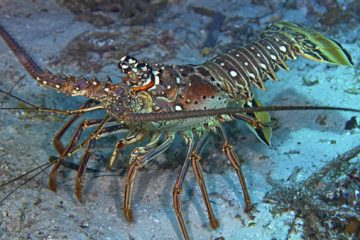 A Marathon trap fisherman accused of using dozens of untagged traps apparently fled to Cuba following a two-month investigation into illegal lobster fishing, according to the Florida Fish and Wildlife Conservation Commission and the State Attorney’s Office. FWC officers served a warrant on Nov. 4 after surveilling the vessel, said FWC officer Bobby Dube. In all, 19 untagged traps were fished, according to the FWC. Some traps were also improperly numbered, records state. A mate aboard the vessel — Juan Miguel Exposito-Carralero, 46 — was charged with 71 misdemeanor counts of fishing illegal traps when FWC officers converged on the vessel after it was returning to port, said Assistant State Attorney Christina Cory. The captain that the FWC had been targeting, Ricardo Hernandez, 52, was not on the vessel at the time and happened to be in Cuba, Dube said. It does not appear he fled, but he left before the warrant was served, Cory added. The case marks a shift in how some poachers are reacting to the FWC as well as the Florida Keys Commercial Fishing Association’s efforts to quelch trap robbing, said the latter association’s executive director Bill Kelly. Read the story here 08:22
A Marathon trap fisherman accused of using dozens of untagged traps apparently fled to Cuba following a two-month investigation into illegal lobster fishing, according to the Florida Fish and Wildlife Conservation Commission and the State Attorney’s Office. FWC officers served a warrant on Nov. 4 after surveilling the vessel, said FWC officer Bobby Dube. In all, 19 untagged traps were fished, according to the FWC. Some traps were also improperly numbered, records state. A mate aboard the vessel — Juan Miguel Exposito-Carralero, 46 — was charged with 71 misdemeanor counts of fishing illegal traps when FWC officers converged on the vessel after it was returning to port, said Assistant State Attorney Christina Cory. The captain that the FWC had been targeting, Ricardo Hernandez, 52, was not on the vessel at the time and happened to be in Cuba, Dube said. It does not appear he fled, but he left before the warrant was served, Cory added. The case marks a shift in how some poachers are reacting to the FWC as well as the Florida Keys Commercial Fishing Association’s efforts to quelch trap robbing, said the latter association’s executive director Bill Kelly. Read the story here 08:22
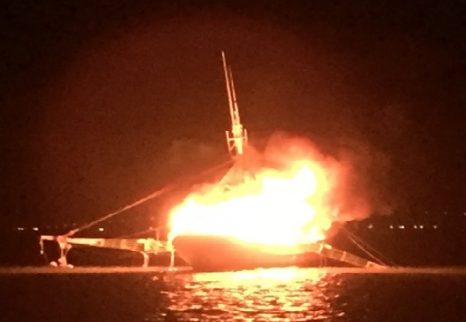
Coast Guard crews rescue 4 people, dog from burning boat
The US Coast Guard rescued four people and a dog from vessel explosion near St. Simons Island Sound. According to the Coast Guard, the fishing vessel caught fire and exploded Thursday around 3:53 a.m. ” The fishing vessel Predator stated it was on fire and was going to abandon ship. The command center in Brunswick contacted station Brunswick crew and launched a 45 foot response boat to the location. When they left the station and got in the channel they saw the fishing vessel explode,” said Petty Officer First Class Luke Clayton. “They were able to hone in on the location immediately. They were able to recover the crew and their dog at about 4:25 a.m.,” said Clayton. EMS crews were on standby, ready to evaluate injuries to the crew members. “We’re concerned about smoke inhalation. But injuries were minor,” said Clayton. Read the rest here 08:16
South Atlantic Region Offshore oil surveys to start as seismic testing opposition grows
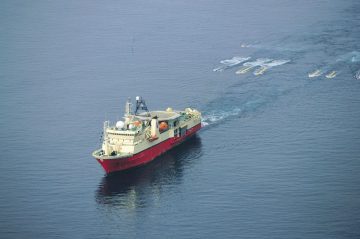 Nearly a half million commercial fishing families have joined the opposition to seismic testing for oil and natural gas in the Atlantic Ocean, according to a South Carolina-based business chamber. Meanwhile, a first, non-seismic survey is set to start. The families, numbering more than 400,000, are part of a coastal residents and business movement that has coalesced into the tens of thousands in South Carolina alone. More than 100 Atlantic coastal communities, thousands of businesses and more than 1,000 elected officials also have called on President Barack Obama to stop the testing, according to South Carolina Small Business Chamber of Commerce and Oceana, an environmental advocate. Meanwhile the federal Bureau of Ocean Energy Management continues to process permit applications from seven probe applicants, including six that want to search in waters off South Carolina. “BOEM is currently in the process of reviewing those permits. Before the permits can be issued, careful environmental analysis is done to ensure the safety of the marine ecosystem,” spokeswoman Caryl Fagot said. Read the story here 09:26
Nearly a half million commercial fishing families have joined the opposition to seismic testing for oil and natural gas in the Atlantic Ocean, according to a South Carolina-based business chamber. Meanwhile, a first, non-seismic survey is set to start. The families, numbering more than 400,000, are part of a coastal residents and business movement that has coalesced into the tens of thousands in South Carolina alone. More than 100 Atlantic coastal communities, thousands of businesses and more than 1,000 elected officials also have called on President Barack Obama to stop the testing, according to South Carolina Small Business Chamber of Commerce and Oceana, an environmental advocate. Meanwhile the federal Bureau of Ocean Energy Management continues to process permit applications from seven probe applicants, including six that want to search in waters off South Carolina. “BOEM is currently in the process of reviewing those permits. Before the permits can be issued, careful environmental analysis is done to ensure the safety of the marine ecosystem,” spokeswoman Caryl Fagot said. Read the story here 09:26
National Marine Fisheries Service issues annual report on Fisheries of the United States, 2015
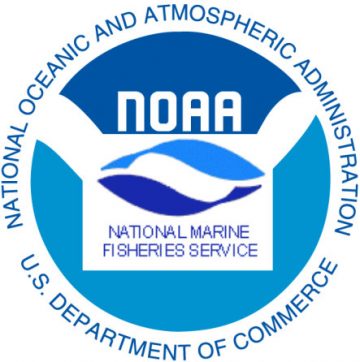 This publication is the annual National Marine Fisheries Service (NMFS) yearbook of fishery statistics for the United States for 2015. The report provides data on U.S. recreational catch and commercial fisheries landings and value as well as other aspects of U.S. commercial fishing. In addition, data are reported on the U.S. fishery processing industry, imports and exports of fishery-related products, and domestic supply and per capita consumption of fishery products. Information in this report came from many sources. Field offices of NMFS, with the generous cooperation of the coastal states and Regional Fishery Information Networks, collected and compiled data on U.S. commercial landings and processed fishery products. The NMFS Fisheries Statistics Division in Silver Spring, MD, managed the collection and compilation of recreational statistics, in cooperation with various States and Interstate Fisheries Commissions, and tabulated and prepared all data for publication. Sources of other data appearing in this publication are: U.S. Census Bureau, U.S. Bureau of Labor Statistics, U.S. Department of the Interior, U.S. Department of Agriculture, and the Food and Agriculture Organization (FAO) of the United Nations. Read the press release here, Read the full report here 09:34
This publication is the annual National Marine Fisheries Service (NMFS) yearbook of fishery statistics for the United States for 2015. The report provides data on U.S. recreational catch and commercial fisheries landings and value as well as other aspects of U.S. commercial fishing. In addition, data are reported on the U.S. fishery processing industry, imports and exports of fishery-related products, and domestic supply and per capita consumption of fishery products. Information in this report came from many sources. Field offices of NMFS, with the generous cooperation of the coastal states and Regional Fishery Information Networks, collected and compiled data on U.S. commercial landings and processed fishery products. The NMFS Fisheries Statistics Division in Silver Spring, MD, managed the collection and compilation of recreational statistics, in cooperation with various States and Interstate Fisheries Commissions, and tabulated and prepared all data for publication. Sources of other data appearing in this publication are: U.S. Census Bureau, U.S. Bureau of Labor Statistics, U.S. Department of the Interior, U.S. Department of Agriculture, and the Food and Agriculture Organization (FAO) of the United Nations. Read the press release here, Read the full report here 09:34
Regulators increase menhaden quota – “Science says the stock’s in good shape,”
 Regulators voted Wednesday to increase the annual quota for menhaden in 2017, giving Maine lobstermen a welcome boost in the supply of a popular bait fish, but no relief for Maine fishermen who want a bigger share of the national menhaden harvest. The Atlantic States Marine Fisheries Commission has struggled to set its quota for the oily forage fish, also known as pogey, with members split between wanting to maintain the annual menhaden catch at 187,880 metric tons and those who say the stock has rebounded enough to raise the quota. On Wednesday, as the commission gathered for its annual meeting in Bar Harbor, the menhaden board voted 16-2 to increase the annual quota by 6.5 percent, to 200,000 metric tons, with Pennsylvania and the U.S. Fish and Wildlife Service holding out for keeping the quota unchanged. “Science says the stock’s in good shape,” said Bill Adler of the Massachusetts Lobstermen’s Association. “I find it difficult that we can deal with overfishing, we can do a good job of cutting things down, but then we have success and we don’t know what to do with it.” Read the rest here 08:07
Regulators voted Wednesday to increase the annual quota for menhaden in 2017, giving Maine lobstermen a welcome boost in the supply of a popular bait fish, but no relief for Maine fishermen who want a bigger share of the national menhaden harvest. The Atlantic States Marine Fisheries Commission has struggled to set its quota for the oily forage fish, also known as pogey, with members split between wanting to maintain the annual menhaden catch at 187,880 metric tons and those who say the stock has rebounded enough to raise the quota. On Wednesday, as the commission gathered for its annual meeting in Bar Harbor, the menhaden board voted 16-2 to increase the annual quota by 6.5 percent, to 200,000 metric tons, with Pennsylvania and the U.S. Fish and Wildlife Service holding out for keeping the quota unchanged. “Science says the stock’s in good shape,” said Bill Adler of the Massachusetts Lobstermen’s Association. “I find it difficult that we can deal with overfishing, we can do a good job of cutting things down, but then we have success and we don’t know what to do with it.” Read the rest here 08:07
Shrimp size on the rise after Hurricane Matthew
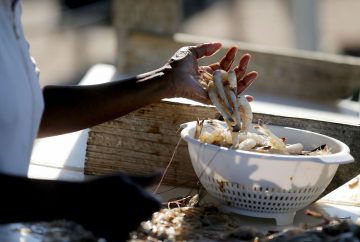 In the midst of fallen trees and other debris, Hurricane Matthew left a sweet little calling card: shrimp, big ones. The storm’s rain and river flooding evidently washed large white shrimp out to the commercial grounds offshore, at least in spots, and some commercial boats are reporting some of the biggest shrimp of the season, hoisting their optimism in a year that’s had its ups and downs. The current cold snap evidently slowed down the catch somewhat. But shrimpers expect it to come back and are looking forward to another big run before frigid winter weather sets in. Shem Creek shrimper Tommy Edwards didn’t net much offshore on Monday, after pulling in hundreds of pounds per day on recent trips. But he expected that to change mid-week, and “the big white shrimp are looking beautiful right now,” he said. “Oh yeah, they’re gorgeous,” Tina Toomer of the Bluffton Oyster Co., said about the catch her husband, Larry Toomer, has been bringing in. Read the story here 13:58
In the midst of fallen trees and other debris, Hurricane Matthew left a sweet little calling card: shrimp, big ones. The storm’s rain and river flooding evidently washed large white shrimp out to the commercial grounds offshore, at least in spots, and some commercial boats are reporting some of the biggest shrimp of the season, hoisting their optimism in a year that’s had its ups and downs. The current cold snap evidently slowed down the catch somewhat. But shrimpers expect it to come back and are looking forward to another big run before frigid winter weather sets in. Shem Creek shrimper Tommy Edwards didn’t net much offshore on Monday, after pulling in hundreds of pounds per day on recent trips. But he expected that to change mid-week, and “the big white shrimp are looking beautiful right now,” he said. “Oh yeah, they’re gorgeous,” Tina Toomer of the Bluffton Oyster Co., said about the catch her husband, Larry Toomer, has been bringing in. Read the story here 13:58Atlantic States Marine Fisheries Commission meeting at Bar Harbor, Maine October 24th-27th – Listen Live
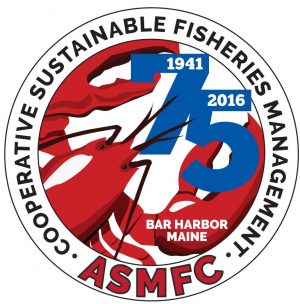 The Atlantic States Marine Fisheries Commission will meet in at the Harborside Hotel 55 West Street Bar Harbor, Maine. The agenda is subject to change. The agenda reflects the current estimate of time required for scheduled Board meetings. The Commission may adjust this agenda in accordance with the actual duration of Board meetings. Interested parties should anticipate Boards starting earlier or later than indicated herein. Click here for details, Click here for webinar 12:10
The Atlantic States Marine Fisheries Commission will meet in at the Harborside Hotel 55 West Street Bar Harbor, Maine. The agenda is subject to change. The agenda reflects the current estimate of time required for scheduled Board meetings. The Commission may adjust this agenda in accordance with the actual duration of Board meetings. Interested parties should anticipate Boards starting earlier or later than indicated herein. Click here for details, Click here for webinar 12:10
Rock shrimp fishing pioneer Rodney Thompson passes away
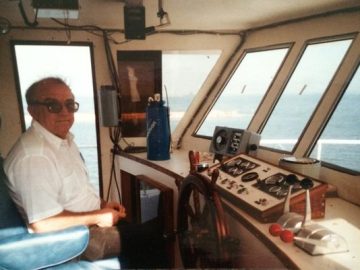 During his long career, he founded T-Craft Boats, Thompson Trawlers, Offshore 30, Thompson Industries, Sand Point Inn, Pelican Point Inn, Ponce Seafood, Dixie Crossroads Seafood Restaurant, Cape Canaveral Shrimp Company and Wild Ocean Seafood Market. Rock shrimp fishing was his claim to fame, with his family following in his footsteps. “Prior to our family getting involved with rock shrimp, they were considered a trash item. Because their shell was so hard, no one was interested in buying them. The conventional mechanical peelers that were used to peel white shrimp, brown shrimp, they would not work on the shell of the rock shrimp,” said Laurilee Thompson, Rodney’s daughter. She now co-owns Dixie Crossroads Seafood Restaurant. Read the rest here 20:17
During his long career, he founded T-Craft Boats, Thompson Trawlers, Offshore 30, Thompson Industries, Sand Point Inn, Pelican Point Inn, Ponce Seafood, Dixie Crossroads Seafood Restaurant, Cape Canaveral Shrimp Company and Wild Ocean Seafood Market. Rock shrimp fishing was his claim to fame, with his family following in his footsteps. “Prior to our family getting involved with rock shrimp, they were considered a trash item. Because their shell was so hard, no one was interested in buying them. The conventional mechanical peelers that were used to peel white shrimp, brown shrimp, they would not work on the shell of the rock shrimp,” said Laurilee Thompson, Rodney’s daughter. She now co-owns Dixie Crossroads Seafood Restaurant. Read the rest here 20:17







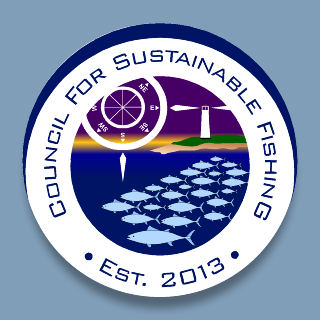
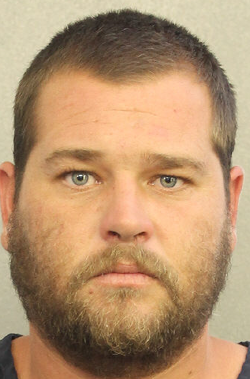 The boat entering the Hillsboro Inlet might have gone unnoticed, if the captain hadn’t made an “aggressive” U-turn beside a sheriff’s boat and headed back out to sea. Broward sheriff’s deputies called out and signaled for the captain to stop. But he just gave them a thumbs up, pointed in an easterly direction and kept going, investigators said. Sheriff’s deputies said they followed the boat — and only gave up when they were 25 miles off shore.The Sept. 14 excursion eventually ended with boat captain James Sawyer’s arrest on federal charges he tried to illegally smuggle 15 people into the U.S. On Thursday, he pleaded not guilty. A Coast Guard cutter stopped the boat nearly three hours after it left the inlet, about 10 p.m. Only two men were visible on the boat, but officers quickly discovered there was a total of 18 people on board.
The boat entering the Hillsboro Inlet might have gone unnoticed, if the captain hadn’t made an “aggressive” U-turn beside a sheriff’s boat and headed back out to sea. Broward sheriff’s deputies called out and signaled for the captain to stop. But he just gave them a thumbs up, pointed in an easterly direction and kept going, investigators said. Sheriff’s deputies said they followed the boat — and only gave up when they were 25 miles off shore.The Sept. 14 excursion eventually ended with boat captain James Sawyer’s arrest on federal charges he tried to illegally smuggle 15 people into the U.S. On Thursday, he pleaded not guilty. A Coast Guard cutter stopped the boat nearly three hours after it left the inlet, about 10 p.m. Only two men were visible on the boat, but officers quickly discovered there was a total of 18 people on board. 


























